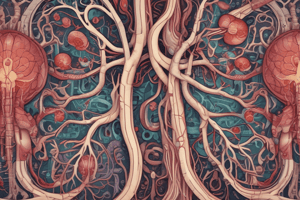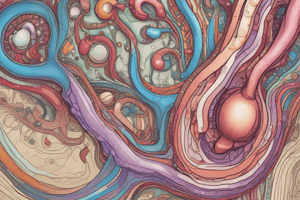Podcast
Questions and Answers
What is the primary function of nephrons in the kidney?
What is the primary function of nephrons in the kidney?
- To store urine until it is eliminated from the body
- To filter waste products and maintain fluid balance (correct)
- To regulate blood pressure
- To produce hormones that regulate electrolyte levels
What is the point of filtration in the nephron?
What is the point of filtration in the nephron?
- Bowman's capsule
- Proximal convoluted tubule
- Distal convoluted tubule
- Glomerulus (correct)
What is the purpose of fenestrations in the glomerulus?
What is the purpose of fenestrations in the glomerulus?
- To regulate blood flow to the nephron
- To increase blood pressure
- To produce erythropoietin
- To allow for the selective filtration of waste products and smaller molecules (correct)
What is the sequence of tubules that waste products pass through after filtration?
What is the sequence of tubules that waste products pass through after filtration?
What is the function of Bowman's capsule in the nephron?
What is the function of Bowman's capsule in the nephron?
What is the functional unit of the kidney?
What is the functional unit of the kidney?
What is the main function of the proximal convoluted tubule in the nephron?
What is the main function of the proximal convoluted tubule in the nephron?
What is the name of the specialized cell type found in the visceral layer of Bowman's capsule?
What is the name of the specialized cell type found in the visceral layer of Bowman's capsule?
What is the function of the distal convoluted tubule in the nephron?
What is the function of the distal convoluted tubule in the nephron?
What is the role of the glomerulus in the nephron?
What is the role of the glomerulus in the nephron?
What is the function of the collecting duct in the nephron?
What is the function of the collecting duct in the nephron?
What is the outer layer of Bowman's capsule called?
What is the outer layer of Bowman's capsule called?
Flashcards are hidden until you start studying
Study Notes
Kidney Structure: Focusing on Nephrons
The kidney structure is a complex system that plays a vital role in maintaining fluid balance and excreting waste products in the body. One of the primary structures within the kidney is the nephron, which is the functional unit of the nephron.
Nephrons: The Functional Units of the Kidney
Nephrons are tiny structures found within the kidney that are responsible for filtering waste products and maintaining fluid balance. They work in a tubular system, where each nephron starts as a spherical ball called a glomerulus, which is surrounded by a capsule called Bowman's capsule. The glomerulus is the point of filtration, where blood enters, and waste products, such as creatinine and urea, are filtered out.
Once the waste products pass through the glomerulus into Bowman's capsule, they continue through a series of tubules: the proximal convoluted tubule, the distal convoluted tubule, and the collecting duct. These tubules reabsorb essential nutrients and water back into the bloodstream while excreting waste products into the urine.
Glomeruli and Bowman's Capsule
The glomerulus is a network of blood vessels where the filtration process occurs. It contains blood capillaries that have a specialized structure called fenestrations, which are tiny pores that allow for the selective filtration of waste products and smaller molecules. The glomerulus is surrounded by Bowman's capsule, which is a double-layered structure that collects the filtered waste products from the glomerulus.
Bowman's capsule has an outer layer called the visceral layer and an inner layer called the parietal layer. The visceral layer contains a specialized cell type called mesangial cells, which help maintain the structure of the glomerulus and regulate blood flow. The parietal layer is continuous with the proximal convoluted tubule and acts as the entry point for the waste products into the tubular system.
Tubular System
The tubular system of the nephron is responsible for reabsorbing essential nutrients and water back into the bloodstream while excreting waste products into the urine. The proximal convoluted tubule is the first part of the tubular system and is responsible for most of the reabsorption of essential nutrients and water. It is also where the pH of the urine is regulated.
The distal convoluted tubule is the second part of the tubular system and is responsible for the final adjustments in the concentration of the urine. It is also where the concentration of the urine is regulated, and the final adjustments in the pH of the urine are made.
The collecting duct is the final part of the tubular system and is responsible for transporting the urine from the nephron to the renal pelvis. It is also where the concentration and pH of the urine are further adjusted.
Conclusion
In conclusion, the kidney structure, specifically the nephrons, plays a crucial role in maintaining fluid balance and excreting waste products in the body. The nephron is composed of a glomerulus, Bowman's capsule, and a tubular system, which work together to filter waste products and reabsorb essential nutrients and water back into the bloodstream. Understanding the structure and function of nephrons can provide valuable insights into the importance of kidney health and the treatment of kidney-related diseases.
Studying That Suits You
Use AI to generate personalized quizzes and flashcards to suit your learning preferences.




